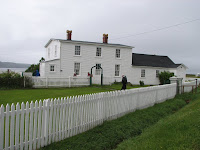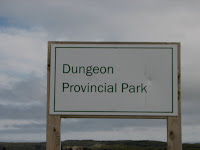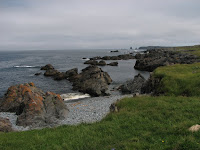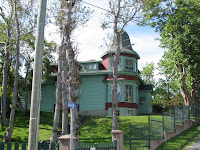July 15-17, 2011. We had a drive of 188 miles from St. John’s to Bonavista Newfoundland.
3231.1
After setting up and relaxing for a few hours we set off to the center at Bonavista for a dinner put on by the locals.
The earliest owner of the Mockbegger Plantation is Joseph Poole, who lived form 1685 to 1771. White had business interests in cod, salmon and seal fisheries, ship building, and a trading company. Since his death, there have been at least nine owners of the property with the property being donated to the Provincial Government in 1980.
After the plantation we made our firs trip of the day to the Cape Bonavista Lightstation. It was foggy so we took a few pictures with the conditions taking turns between being foggy and the n clearing. There are Puffins and I did get a picture through the fog. The rock formations are stunning.
We decided to go to the “Dungeon Provincial Park” hoping that the fog had burnt off there. We were rewarded with excellent conditions.
3299
We wanted to make one more stop before lunch so we went to see the “Mathew”. Bonavista claims that John Cabot sailed here in his ship the “Mathew” and landed in 1497. St. John’s also makes that claim but as a local told us, Bonavista built a replica of the ship and has it on display so that makes their claim valid. The ship is a carvel, which is a small, fast and maneuverable sailing vessel that was developed in the 15th century. This class of ship was usually 20 to 30 meters long about 7 to 10 meters wide. He had a crew of 18 men. The ship is in a building so pictures of the exterior are limited. Interior pictures are not
After lunch we returned to the light house, Except for a few patched, the fog had cleared, visibility was excellent and the whales were fairly close to shore.
3357
The pictures of whales I took are on Shutterfly. You can access them at:
I’m not including them here because the next day I got better ones.
We started the next day, July 17, at the Building that housed the Fisherman’s Protective Union (FPU) in the town of Port Union. It was started by William Coaker in 1908. It flourished and lasted until 1960. William Coaker was an above average individual who left school at 14 to take a clerical position with a company and six years later was the company’s owner. Undeterred by bankruptcy when the banks crashed in 1894 he turned to farming, became concerned about the welfare of the fisherman and formed a union to improve their lives. He started a union newspaper and created the Union Trading Company with imported supplies and sold them to the FPU members at cost. He became Minister of Marine and Fisheries in 1919 and was made a “Knight Commander of the Most Excellent Order of the British Empire for his contributions to Newfoundland”. He died in 1938 and the union lasted until 1960.
The Coaker home and row house for the captains
We headed for the town of Ellison and to Puffin Point. On the way we did come upon another interesting rock formation where the water is enlarging a hole it has worn through the rock.
It was a bit of a walk to the site. Along the way I did find more interesting rocks to take pictures of. Along with the Puffins there were whales. Most appeared to be humpbacks.
This one is a mother and her calf swimming away from were I was standing.
3456
There are more pictures at: http://summer2011jb.shutterfly.com/pictures/2685
On the way back we stopped at the Puffin Festival. We had a “Jiggs Dinner”. This a local Newfound land dish and consists salt beef, and five different vegetables. They are all boiled together in a pot and scooped out on a plate. The salt beef tasted a lot like corned beef. It added enough salt to the vegetables that for me no additional salt was needed.
After lunch we stopped for a few picture of root cellars. These cellars, typically dug into the side of ah, served as a family refrigerator for storing root vegetables.




























You took several more "suitable for framing" photos.
ReplyDeleteThanks